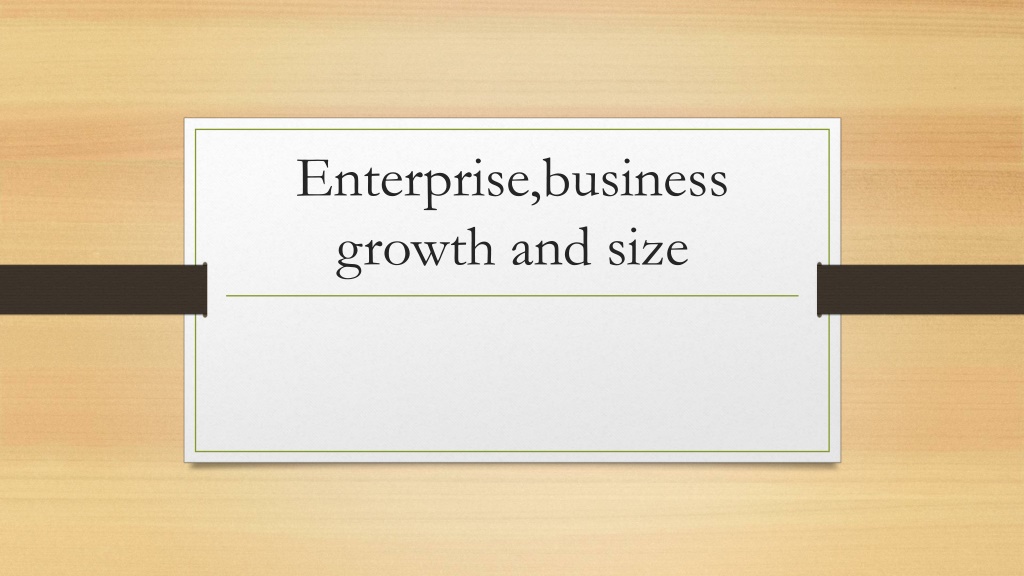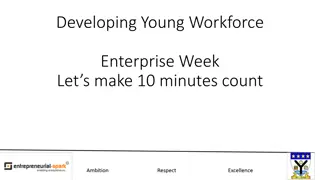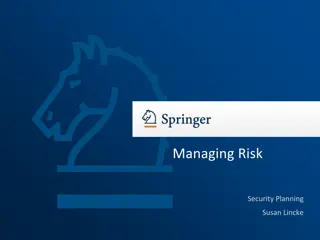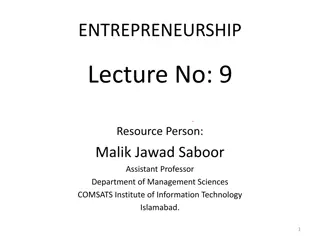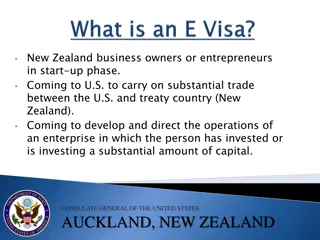Key Traits of Successful Entrepreneurs: Hard Work, Risk-Taking, Creativity
Successful entrepreneurs exhibit characteristics such as hard work, risk-taking, creativity, optimism, and self-confidence. They are innovative, independent, and effective communicators. Starting a business comes with benefits like independence and potential wealth but also risks like failure and financial investment. Not everyone is suited for entrepreneurship, as it requires a certain mindset and willingness to take risks. Many famous business leaders began as entrepreneurs and achieved great success by following their own business ideas.
Uploaded on Oct 05, 2024 | 0 Views
Download Presentation

Please find below an Image/Link to download the presentation.
The content on the website is provided AS IS for your information and personal use only. It may not be sold, licensed, or shared on other websites without obtaining consent from the author. Download presentation by click this link. If you encounter any issues during the download, it is possible that the publisher has removed the file from their server.
E N D
Presentation Transcript
Enterprise,business growth and size
what will you do when you leave university ?
Entrepreneurship An entrepreneur is a person who organizes, operates and takes the risk for a new business venture
What are the benefits and possible disadvantages of starting up your own business (being an entrepreneur)? Benefits Disadvantages Risk- many new businesses fail, especially if there is poor planning Capital entrepreneurs have to put their own money into the business and possibly ,find other sources of capital Lack of knowledge and experience in starting up a business. Opportunity cost(Is the next best alternative given up by choosing another item )-lost income from not being an employee of another business . Independence-able to choose how to use time and money Able to put new ideas into practice May become famous and successful if the business grows May be profitable and income might be higher than working for someone else Able to make use of personal interests and skills .
For many successful entrepreneurs starting up their own business has led to great wealth and fame. How many of these business leaders have you heard of??that started out as entrepreneurs with their own business ideas
Would everyone make a good entrepreneur? Probably not some people don t have the characteristics of successful entrepreneurs. As they do not like risk or working independently they might prefer to be an employee of a large business instead.
Characteristics of Successful Entrepreneurs
Characteristics of successful entrepreneurs Reasons why important Hard working Long working hours and short holidays Risk taker Making decisions to produce goods and services that people might buy is potentially risky. Creative A new business needs new ideas about products and different ways to attract customers. Optimistic Looking forward to a better future and Not to think of failure. Self-confident Self-confident is necessary to convince people, banks of your skills and that your business is going to be successful. Innovative Being able to put new ideas in practice in interesting ways. Independent Entrepreneurs will often have to work by their own before they can afford to employ others. Effective communicator Talking clearly and confidently to banks ,customers & government agencies will raise the new business profile.
Definitions to Learn Loan: is defined as to give someone money that will be repaid with interest or an object that will be returned. Grant: is an amount of money that a government or other institution gives to an individual or an organization for a particular purpose such as education or business improvements. Interest rate: is the amount you are charged for borrowing money, shown as a percentage of the total amount of the loan. Grants unlike loans that generally do not have to be repaid.
Business plan A bank will certainly ask an entrepreneur for a Business plan before agreeing to a loan or to help finance the new business A business plan is a document containing the business objectives and important details about the operations, finance and owners of the new business. Without this detailed plan , the bank will be reluctant to lend money to the business .even with a detailed business plan , the bank might not offer a loan if the bank manager believes that the plan is not well completed . So business plan needed to: To help gain finance Careful planning to reduce risk
Contents of a business plan Every business plan might be different, but generally business plans contain similar headings .the contents of a business plan will usually include the following : Description of the business: provides a brief history and summary of the business , and the objectives of the business. and full details about what the business sells or delivers. The market: describes the market the business is targeting: Total market size. Target market Analysis of competitors Predicted changes in the market in the future.
Business location and how products will reach customers: the physical location if applicable and Internet sales or mail order. how the firm delivers products and services to customers. Organization structure and management : management and employees details, and the skills required for the employees. Financial information : Sources of capital, ex(owner s capital , bank loans or any other funding's) predicted costs-fixed costs and variable costs.
Why governments support business start-ups most governments offers support to entrepreneurs and there are several reasons why this support is given To reduce unemployment: new business will often create new jobs. To increase competitions: new business give consumers more choice. To increase output: new business will increase output of goods and services that will benefit the economy To benefit society : by supporting disadvantaged groups in society with new jobs. Disadvantaged groups(groups of people that experience a higher risk of poverty, discrimination than the general population) Can grow further: by supporting new firms the government may be helping some firms to grow and become important in the future.
How governments supports business start-ups Business start-ups need Governments often gives support by Business idea and help Organizing training for entrepreneurs that gives advice offered by experienced business people. Premises Provides low cost premises to start-up businesses . Finance Loans for small businesses with low interest rates . Labour Grants to small businesses to train employees and help increase their productivity. Research Encouraging universities to make their research facilities available to new business entrepreneurs.
Who do you think would find it useful to compare the size of businesses? And why? 1. Investors (an individual or an organization that gives money to another person or organization with the expectation of achieving a profit) before deciding which business to put their savings into. 2. Governments because there are different tax rates for small and large businesses. 3. Competitors(are other businesses who can offer the same or similar goods and services to your customers.) to compare their size and importance with other firms. 4. Workers- to know how many people they might be working with. 5. Banks to know how important a loan to the business.
Methods of measuring business size and limitations of these methods Number of employees: larger firms have larger workforce employed. Value of output: larger firms are likely to produce more than smaller ones Value of capital employed(is the total value of capital used in the business): larger businesses are likely to employ much more capital than smaller ones. Value of sales (The amount of money businesses earn from selling their goods and services) is often used to compare the size of retailing businesses especially retailers selling similar products(Ex.food supermarkets) .
However, these methods have their limitations and are not always accurate. Example: When using the number of employees method to compare business size is not accurate for a capital intensive firm ( one that employs a large amount of equipment) can produce large output by employing very little labour. . There is no perfect way of comparing the size of businesses , its quite common to use more than one method to compare the results obtained.
